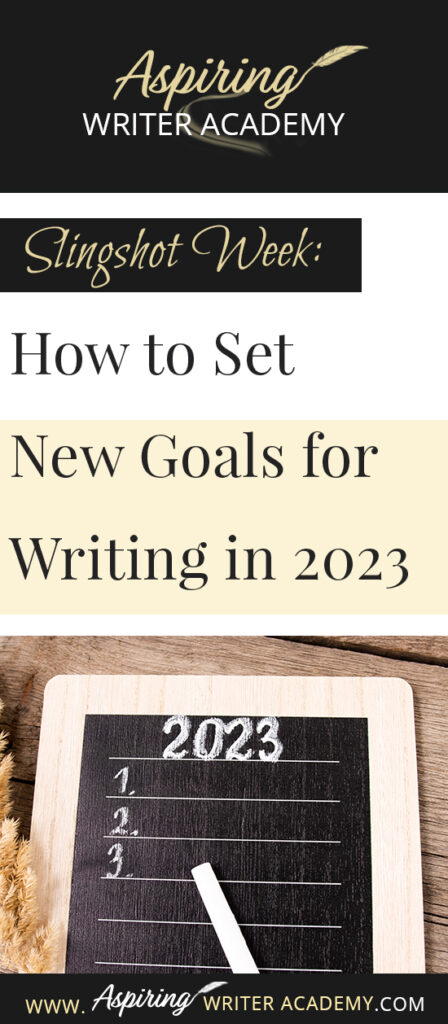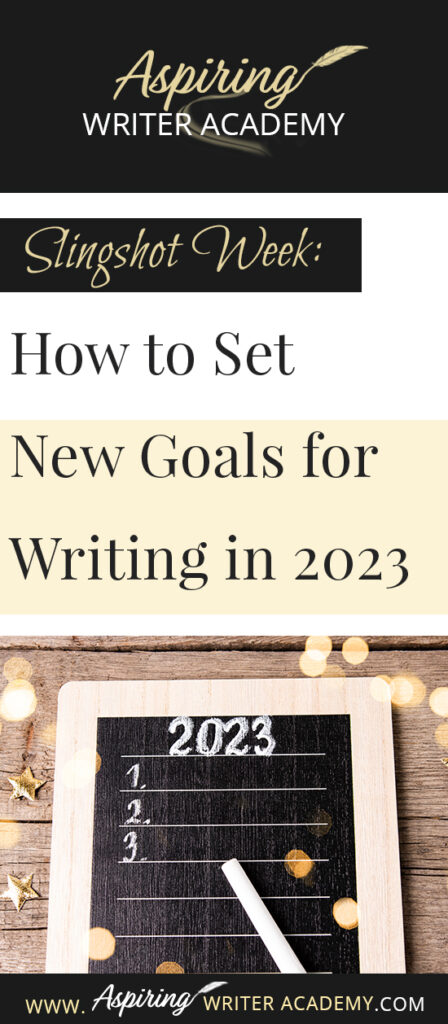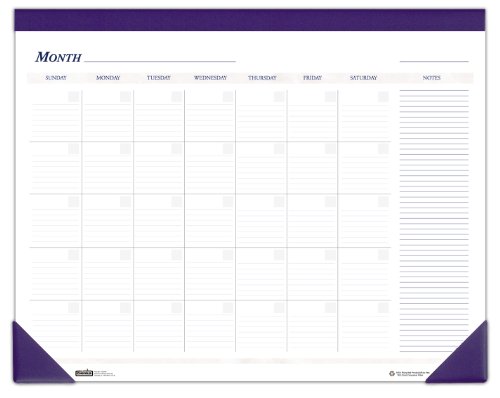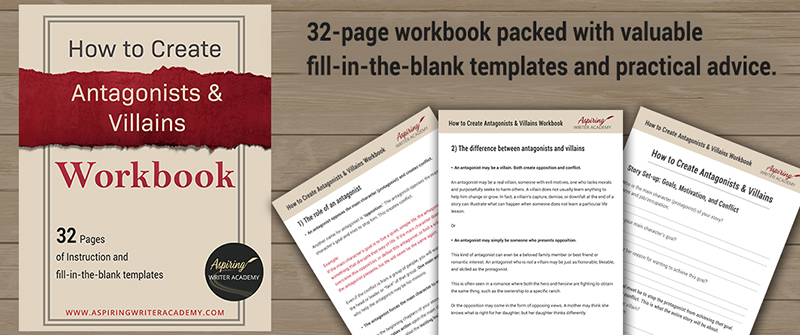Slingshot Week: How to Set New Goals for Writing in 2023

Do you need to recharge after the holidays? Are you looking forward to setting new goals for the coming year? Or at least the next 90 days? The week between Christmas and New Year’s is the perfect time to take a deep breath and reevaluate where you are at in your writing journey and where you want to be.
In Slingshot Week: How to Set New Goals for Writing in 2023 we offer tips on how to use this week to your advantage to help you succeed in the coming year!
I first heard the term ‘Slingshot Week’ from my author friend, Cara Grandle, https://caragrandle.com/
She explained to me that every year she takes the week between Christmas and New Year’s to relax, regroup from the hectic holiday season, and just take time to think. After months of phone calls, baking, gift buying, visiting family, and running from event to event, the idea of taking some time to refresh sounds very appealing.
Perhaps, you need a break too.
And if that week is still crazy busy for you, then maybe you will want to plan a ‘slingshot’ week after New Year’s. Some writers, who make new goals every 90 days, instead of a year, take a ‘slingshot week’ for themselves between each 90-day segment.
The point is to set aside a week or a few days just for yourself.
In the post below, we give you tips to:
- Refresh Your Mental Well-being
- Evaluate the Past
- Reset Your Calendar
- Balance Your Personal vs. Writing Life
- Create a New Writing Schedule
- Decide on Future Projects
- Choose Which Classes & Conferences to Attend
- Sketch Out a Marketing Plan for the New Year
1) Refresh Your Mental Well-being
During your ‘Slingshot Week’ it is important to take quiet time for yourself. This means eliminate phone calls, social media, and your time plugged into the computer or other electronics as much as possible. Do not schedule any lunch dates or social get togethers.
This is your week to evaluate the progress you’ve made on your writing over the past year (or 90-day segment) and thoughtfully ponder what comes next.
If you have been overwhelmed with activities over the holidays, this is your time to relax, recharge, take a deep breath, go for a walk in the woods to clear your head. Perhaps schedule a massage, watch a good movie in your pajamas, eat the chocolates you got in your stocking (before you start a New Year’s diet.)
If you do not take time to refresh your physical and mental health, you cannot think clearly or creatively. Busyness, stress, and lack of sleep kill our imagination and creativity. You need time to unwind and allow your brain the freedom to dream again, to consider future possibilities, to brainstorm new ideas.
Proper rest can unleash the excitement and motivation for writing again. So be kind to yourself. Do some fun, relaxing, or invigorating things just for you!
What have you really wanted to do that you’ve been pushing to the wayside for far too long?
Perhaps you’ve really wanted to connect with a friend or loved one but haven’t had time. Or maybe you have been itching to really clean out your bedroom closet or office. Maybe you have wanted time to paint, or sew, or go on a day trip.
Do it now, and your enthusiasm for life and your motivation in general will soar!
2) Evaluate the Past
Next, you will want to evaluate the past. It doesn’t do any good to rush from one project to another without taking a break in between to consider what went well and what didn’t. You want to learn from your mistakes, so you do not repeat them in the future.
Did you accomplish your writing goals for the past year?
If yes, how will you reward yourself for a job well done? Celebrating your accomplishments boosts morale and keeps you motivated to do more. What were your strengths and how do you think you can maintain or succeed that level of progress in the coming year?
If you did not achieve your writing goals, you must now ask yourself—WHY? Be honest. What went wrong? What were your main challenges? How far did you fall off course? What could you have done to prevent this?
Sometimes, outside events and situations beyond our control enter our lives and we have to accept that this is a temporary ‘season’ where we just have to roll with the punches and do our best to survive. During these times, you may be forced to put your writing aside.
But more often, the problem is a weakness within us. Did you waste time indulging in procrastination? Did the lure of instant gratification with some shiny new tool, or plugin or writing course, or promotion opportunity keep you from actual writing? Did you decide to switch projects, perhaps two or three times, and still did not finish anything? Or did you let your personal life overshadow your writing schedule?
During this ‘Slingshot Week’ it would be very helpful to identify areas in your writing or your life that need improvement. In the coming year, what can you do differently?
3) Reset your calendar
Before you can start making new plans for the coming year (or your next segment of writing), you need to get a new calendar.
- Decide whether you want a desk calendar, wall calendar, a new daily-weekly-monthly-yearly planner, or a bullet journal with a calendar that you create. Ideally, you want something that shows more than one month.
- Mark down all relevant birthdays, anniversaries, holidays, vacations, writer conferences, and family events so they do not conflict with your writing schedule.
- Consider the fact that you may need some flexibility in your schedule for sick days, unexpected personal emergencies, and for personal time to pursue other creative interests.
- Now here’s the hard part. It’s time to be REALISTIC. Looking at your calendar, how much time do you have to pursue writing? Can you schedule specific blocks of time each week to concentrate on your writing? When will you write?
- Considering the writing projects that you have in mind, as well as the marked-up calendar in front of you, when can you realistically expect to finish your project? How much can you get done each week, each month? Are you allowing yourself enough wiggle room to allow for adjustments?
4) Balance Your personal vs. writing life
While some writers can lock themselves in a closet and pump out a book, that is not the healthiest choice for the rest of us. Most writers need to balance their writing time with their personal life to avoid stress and boredom (motivation problems), as well as health and relationship problems.
Whenever you are creating a new writing schedule or planning a new writing project, look at your calendar and set aside blocks of time to write and other blocks to enjoy life, connect with friends and family, and rejuvenate. Writers are not robots and cannot keep cranking out pages with the same level of energy day after day without some time to rest.
Look at your daily activities:
- When will you exercise?
- When will you write?
- When will you engage with social media?
- When will you eat? (Don’t forget to eat lunch!)
- When will you spend time with your family?
- Do you have enough ‘down’ time built into your day or week, so you are not always on the go-go-go?
How well have you handled your personal life – writing life balance in the past?
What changes can you make this coming year to create a more balanced life?
Can you write 4 days a week and take day 5 to catch up on laundry, shopping, and etc.?
Or you may want to write 4 days a week and use day 5 to create social media posts, leaving the weekend for personal things.
Maybe you will write 5 mornings a week, and use 2 afternoons for social media/marketing, and schedule everything else around those time blocks as best you can.
Sometimes, your time blocks may need to be switched around. However, try to start each week, and each day with a plan.
5) Create a New Writing Schedule
After you have everything that we’ve discussed above locked into place, or at least swirling about in the forefront of your mind, it is time to think about creating a new writing schedule.
Did you have a schedule, certain days and times, that you worked on your writing projects this past year? How did that work out for you? Do you need to make some adjustments?
Do you need to switch your days for writing?
Do you need to get up an hour earlier to give yourself more time? Or stay up at night an hour later, so you can write after the family is in bed and all is quiet?
Do you need to limit your writing to weekends, to allow you to concentrate on your day job and family or other personal activities during the week?
If you wrote haphazardly and did not actually schedule time to write on your calendar and stick to it, perhaps you may now want to try using a writing schedule.
Every writer is different and each of our lives are different. The key is to find what will work best for you.
6) Make a Decision on Future Projects
If you are in the middle of writing a novel, you may want to use ‘Slingshot Week’ to evaluate how the writing process is going. Are you ahead, behind, or right on target? How can you readjust your calendar or writing time blocks to meet your deadline in the coming year?
If you have finished a project at the close of this year, you may need to think about what you want to write next. Have you brainstormed your next story idea? Do you know what you want to work on in the coming year? How many books, articles, or blog posts do you want to write? (Remember to consider your calendar to realistically consider what is possible.)
Also be sure to take time to evaluate where you are in your writing career. Are you where you want to be? If not, what steps can take you to the next level?
- Do you need to take a class or online course?
- Do you need to build your author platform?
- Or grow your list of email newsletter subscribers?
- Do you need to learn more about book promotion?
- Or improve your computer skills?
- Do you need to find a literary agent?
7) Choose Which Classes & Conferences to Attend
A writer must never stop learning. Continual education is a must. Not only to improve writing skills, but also to stay fresh. Sometimes busy writers will get stuck on a plot problem, and suddenly realize they need to go back to basics to figure it out.
Attending classes and conferences is not only about the learning, but also about the networking. Meeting other authors, agents, editors, and marketing gurus is just as important to an author’s career as writing the book. The inside information you may hear can open doors of opportunity that you may have never imagined.
Although in-person gatherings are always best, attending an online class or conference can be beneficial as well.
Do an online search for writing classes and conferences in your area, or if you can afford airfare, you may want to venture further. National conferences feature many prestigious keynote speakers, instructors, agents, and editors all gathered in one place.
Considering your calendar, and your writing schedule and potential deadlines, which classes and conferences are feasible and affordable for you to attend in the coming year?
8) Sketch Out a Marketing Plan for the New Year
Finally, as if you didn’t already have enough on your plate (or writing calendar), what is your marketing plan for the new year?
If you are not yet published, will you create an author Facebook Page or set up a website to help build your author platform and build interest for your writing?
Do you want to start a blog, podcast, or YouTube channel?
If published, what are your plans for book promotion? Do you have a street team to help promote your new book release? How many months in advance will you set up for pre-orders? Are you planning to do any book signings or attend multi-author book events this year?
Again, you will need to consult your handy-dandy calendar or planner!
As you can see, there is a lot to think about. However, you can make it work and find success in the coming year if you take the time to relax, refresh, and evaluate both the past, the present, and the future.
Schedule your very own ‘Slingshot Week’ not just once, but perhaps several times throughout the year to make sure that your writing and your life are headed in the right direction.
If you get off track, just pause, readjust, and start over.
You’ve got this!
We hope you have enjoyed Slingshot Week: How to Set New Goals for Writing in 2023 and that you have gained some valuable tips to make a solid plan for success in the coming year!
If you have any questions or would like to leave a comment below, we would love to hear from you!
Do you find it difficult to create compelling antagonists and villains for your stories? Do your villains feel cartoonish and unbelievable? Do they lack motivation or a specific game plan? Discover the secrets to crafting villains that will stick with your readers long after they finish your story, with our How to Create Antagonists & Villains Workbook.
This 32-page instructional workbook is packed with valuable fill-in-the-blank templates and practical advice to help you create memorable and effective antagonists and villains. Whether you're a seasoned writer or just starting out, this workbook will take your writing to the next level.
Our Goal for Aspiring Writer Academy is to help people learn how to write quality fiction, teach them to publish and promote their work, and to give them the necessary tools to pursue a writing career.
And if you would like additional help developing your story idea, we invite you to download our Free Brainstorming Your Story Idea Worksheet.
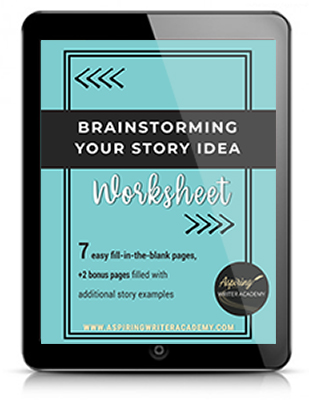
ENTER YOUR EMAIL BELOW
TO GET YOUR FREE
"Brainstorming Your Story Idea Worksheet"
7 easy fill-in-the-blank pages,
+ 2 bonus pages filled with additional story examples.
A valuable tool to develop story plots again and again.
Other Blog Posts You May Like
3 Levels of Goal Setting for Fiction Writers
7 Steps to Begin Writing a New Fictional Story
50 Top Resource Books for Fiction Writers
45 Motivational Quotes for Aspiring Writers
Fiction Writing: Office Supplies to Help You Prepare to Write Your Next Novel
25 Quotes, Tips, and Advice from Famous Authors
25 Quotes to Inspire Your Creative Writing
How to Prep for NaNoWriMo (National Novel Writing Month)
Fiction Writing: How to Find a Critique Partner/Group
How to Research Information for a Historical Novel
The Pros and Cons of Writing Holiday Fiction (Collections & Anthologies)
Fiction Writing: 5 Key Differences Between a Novel and a Novella
Scene & Sequel: The Secret to Plotting an Epic Novel
Scene & Sequel: The Secret to Plotting an Epic Novel (Part 2)

is a multi-published author, speaker, and writing coach. She writes sweet contemporary, inspirational, and historical romance and loves teaching aspiring writers how to write quality fiction. Read her inspiring story of how she published her first book and launched a successful writing career.





